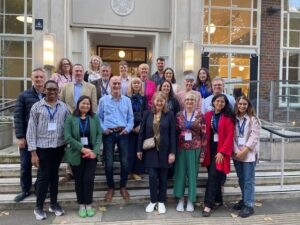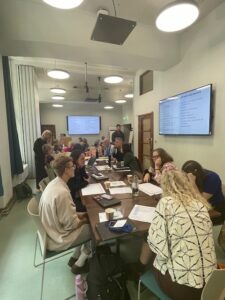
Introduction
In mid-September University Commercialisation and Innovation Policy Evidence Unit (UCI), NCACE and RNCM came together to host a rich and timely workshop on Improving data and metrics to better capture the value of university knowledge exchange: insights from the arts and humanities and cultural sectors.
We did so to create a space for discussion on how to improve the data and metrics to better capture the value of university knowledge exchange (KE) in the arts and cultural sectors. The workshop also formed part of UCI’s work programme with Research England (RE) to develop a modern framework for measuring knowledge exchange to support their development of next generation metrics at the national level for KE.
Knowledge Exchange in the arts and cultural sector has been shown to be a valuable tool in addressing challenges relating to place, health, climate and the environment, to name a few, yet this value does not always seem to be reflected in current KE data collections. So, we were keen to use the workshop to better understand how these contributions enabled by KE can be better incorporated into KE frameworks and data collections moving forward.
Over the past year, UCI has been working to develop and update a conceptual model for KE that aims to provide a framework for better capturing the breadth, performance and value of KE. Recognising the diversity of the university sector, as part of this effort, we joined forces to bring together a group of academics and professionals from a broad range of institutions all of whom are involved in and concerned with KE with the arts and culture sector and who stand out for their strategic use of metrics and for their ability to craft compelling narratives using data to demonstrate the value of their work.
We started by reflecting on some of the events and publications on Cultural Knowledge Exchange that NCACE has produced since our public launch in 2021, the most recent of which was Small and Specialist Arts Institutions and the KEF published in 2024.
We acknowledged that it is a really challenging time for the university sector and that good leadership - and its facilitation – is more important than ever to future proof the sector.
We also spoke about the fact that Knowledge Exchange in the arts and humanities and with the culture sector and other such bodies generates a plethora of values and that, in challenging times, making the case for that work can be difficult, especially for smaller arts specialists, some of whom currently are not in receipt of HEIF funds.
Arts and humanities KE is often, but not exclusively of course, developed in partnership with arts and culture sector organisations including the GLAM (Galleries, Libraries, Archives and Museums) sector and local authorities. That’s one of the key reasons why we at NCACE are so keen to support this work.
Place-making, community building, education, climate change and environment, health, innovations in creative technology, supporting organisations that are important parts of cultural and economic ecosystems, and being at the forefront of truly excellent public and cultural engagement - these are all areas where the arts and humanities are generating ground-breaking knowledge exchange and encouraging all kinds of innovations.
Supporting efforts in civic and community cohesion in these times of increasing instability and rapid societal, technological and political change is likely to become increasingly important. Such work will require skillsets including courage, empathy and risk-taking. These are the sorts of skills that are hard to quantify but without them we may all be immeasurably poorer.

Revealing the value of KE in the arts and cultural sectors
The workshop was primarily concerned with focusing on values and datafication of KE. Our participants, who were attending from a wide range of institutions, came together in this endeavour, working to pool their knowledge, insights, ambitions, challenges and imagination in this task through two key interconnected sessions which we outline further below. Our first session focussed on mapping and exploring the value that KE creates in the world, for example, this may be economic, social, environmental, educational, or health and wellbeing value. We discussed what value is or isn’t currently captured and / or rewarded by relevant national KE datasets, such as the Higher Education Business and Community Interaction (HEBCI) return, and we factored in regional differences in such metrics, that for example drive the new Knowledge Exchange and Innovation Fund (KEIF) in Scotland.
Designing new metrics to better capture the value of arts and cultural KE interventions, the second part of the workshop turned to the practical and conceptual challenge of designing better metrics to reflect the contribution of knowledge exchange through arts and cultural mediated knowledge exchange.
Building on the earlier discussion of forms of value created, participants worked in four parallel groups, each exploring a different theme where new or improved metrics could help capture the richness of arts and cultural engagement. Participants worked on identifying the data sources, collection methods, and criteria needed to make them meaningful metrics.
One group examined local regeneration, reflecting on how cultural interventions attract investment and strengthen community resilience with opportunities to deepen links to liveability indices. Another considered knowledge exchange in progress, discussing how the lifecycles of networks and its impact on knowledge assets might be better represented. A third group tackled audience metrics and behavioural change, looking at how public engagement activities support wellbeing, health, and sustainable behaviours and how to strengthen current data collection systems to reliably reflect its transformative potential. The final group explored consultancy, recognising both academic and freelance contributions and the need for a typology that better captures the diversity of practices and impacts.
Concluding remarks/call to action
These discussions fruitfully advanced ideas for more meaningful ways to capture the structure and value of knowledge exchange in the arts and cultural sectors. And as anticipated, the day’s work also of course revealed the challenges of designing new metrics and strengthening existing ones. It was acknowledged that further focused work is now needed to narrow down the shape of the data needed, supported by open dialogue across the sector to reach consensus on what our metrics should look like and how to make them sound, comparable, and trusted.
Going forward we look forward to working together to build on the day's work and will be creating further opportunities to feed into the work as it evolves. Please do be in touch if you would like to be part of this ongoing activity.
Image 1 & 2 caption: Knowledge Exchange Framework Workshop, 16 September 2025, held at The Warburg Institute.
